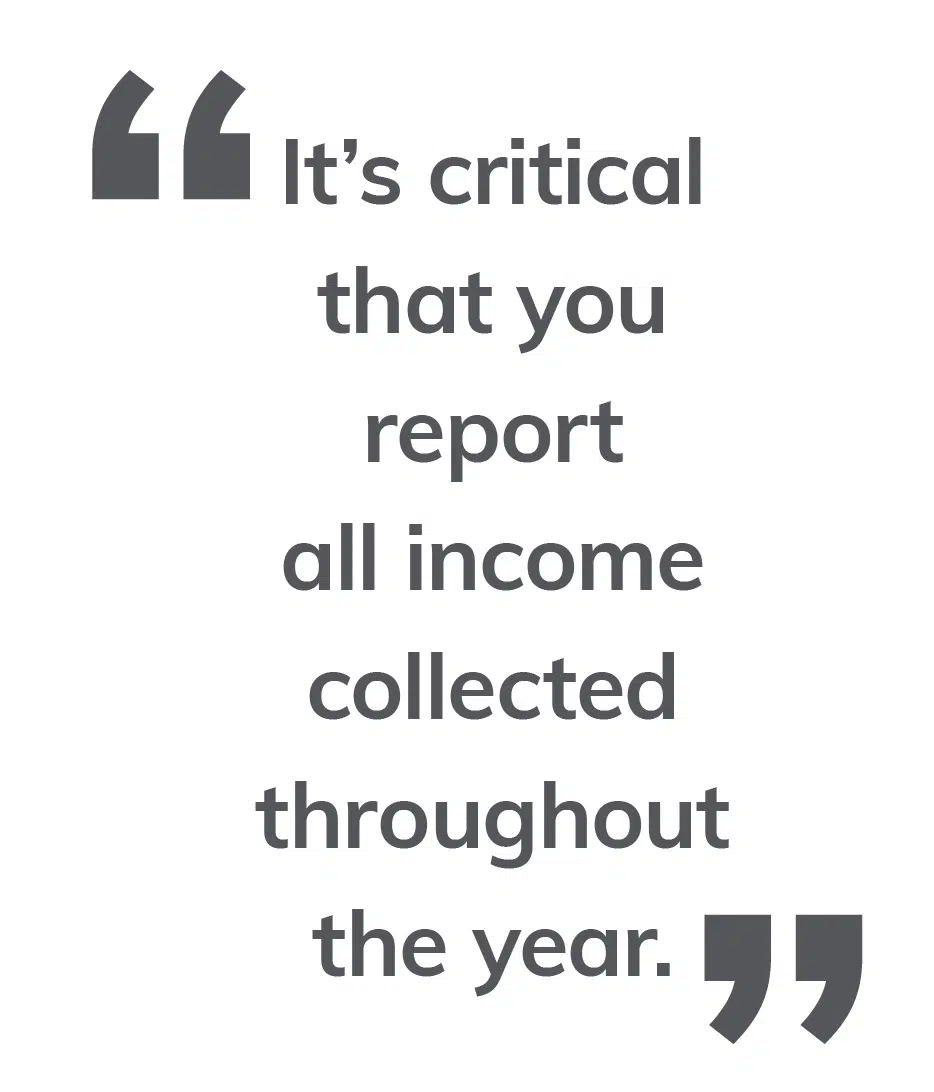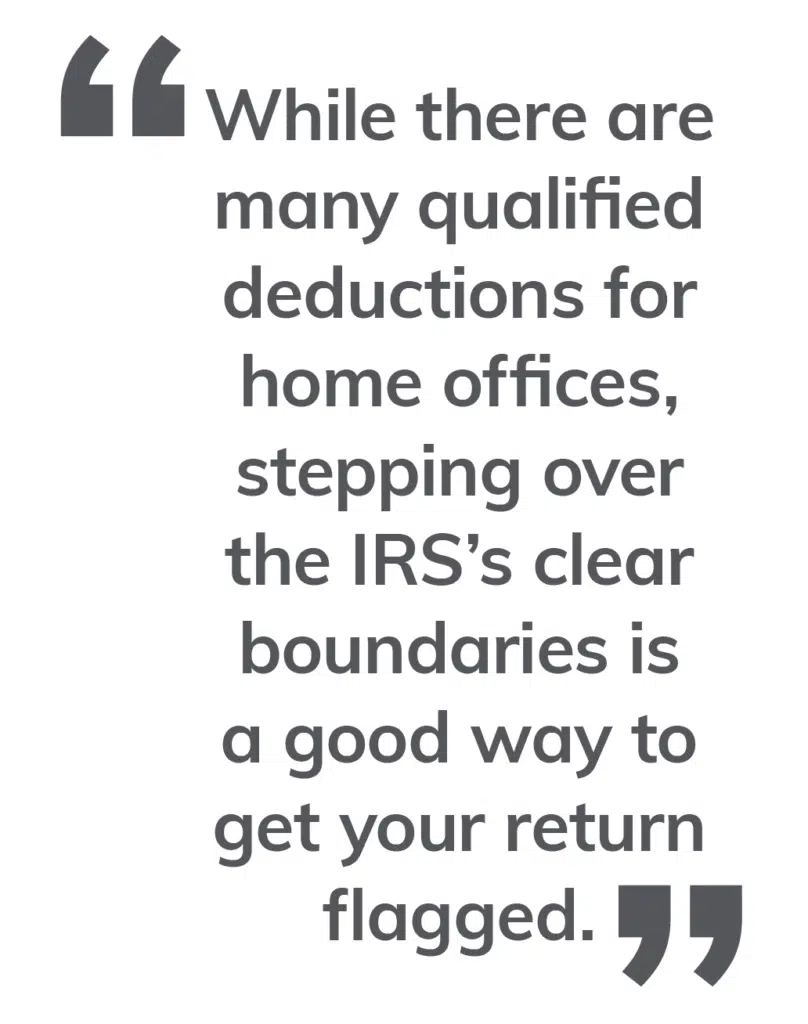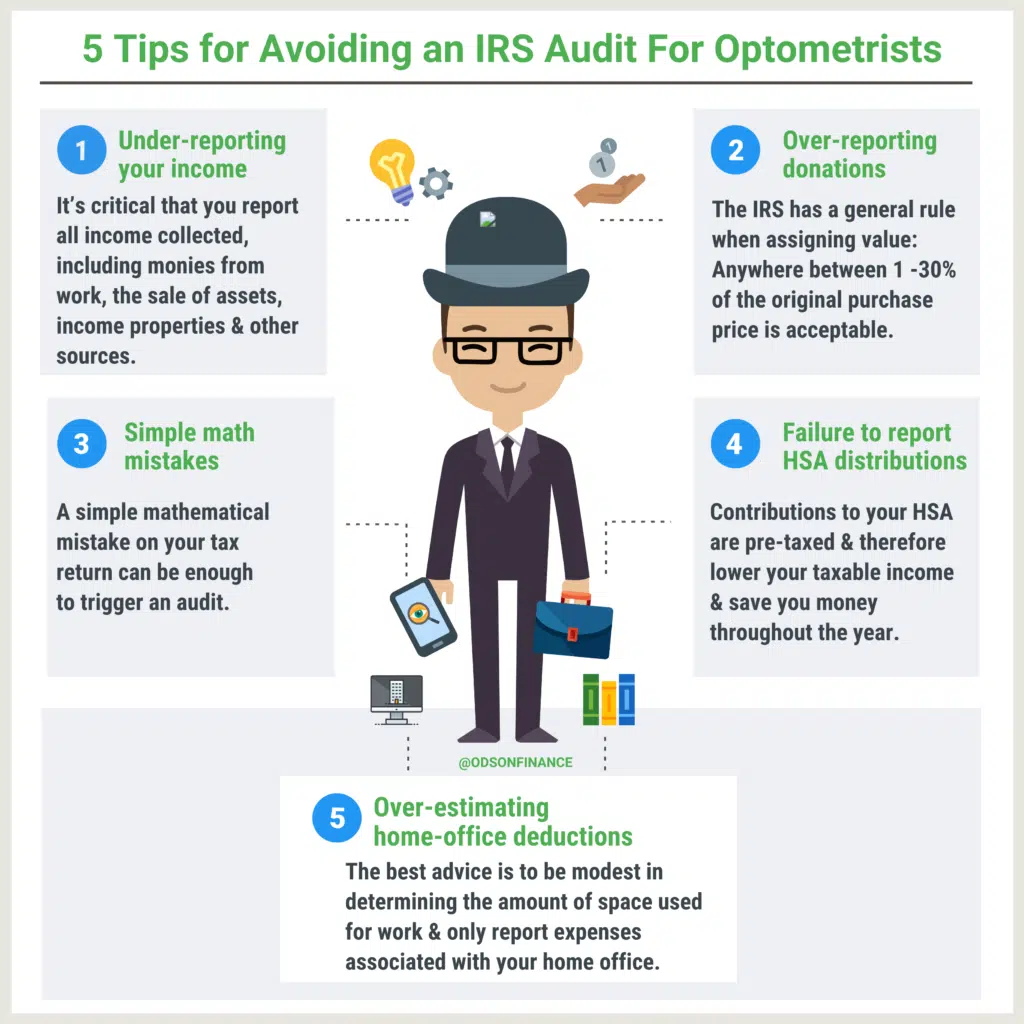5 Tips for Avoiding an IRS Audit For Optometrists

Editor’s Note: This is a guest post written by Jose Diaz Caro – Optometry Practice Accountant, who is one of our tax experts partner. Feel free to connect with him!
Aaron and Dat are extremely strict about guest requirements in that they must be educational and informative to our readers. Every guest post is vetted, read and upheld to the highest standards of ODsonFinance. Your trust is the most valuable factor to us. We like having experts in their field write on our website, enjoy and give us feedback!
KEY POINTS:
-
(1) It can be tempting to under-report income— with the notion of reducing your tax burden— but trust that this is never a good idea. It’s critical that you report all income collected throughout the year, including monies from work, the sale of assets, income properties and other sources.
-
(2) Don't over-report donations. The IRS has a general rule in relation to assigning value: Anywhere between 1 percent and 30 percent of the original purchase price is acceptable.
-
(3) A simple mathematical mistake on your tax return can be enough to trigger an audit.
-
(4) Unreported distributions from an HSA (Health Savings Account) is another key trigger with the IRS.
-
(5) While there are many qualified deductions for home offices, stepping over the IRS’s clear boundaries is a good way to get your return flagged.
Stay off the IRS’s radar by eliminating a few common red flags...
We are happy to see you here—digging into another educational resource developed to offer you valuable tips on how to avoid an IRS audit. While an IRS audit can happen via random selection, in many cases, it’s the actions of the taxpayer that trigger the audit process. And that’s why we put together this helpful guide—outlining five common red flags. Understanding these triggers can save you a lot of potential trouble and anxiety. We are here to help. So, if you have questions or would like to consult with a member of our team, please reach out to our firm today.
Common red flags to avoid...No one wants to tangle with the IRS. The good news is that, in most cases, you can dodge the painful audit process if you understand and avoid these five common triggers:
(1) Under-reporting your income
It can be tempting to under-report income— with the notion of reducing your tax burden— but trust that this is never a good idea. It’s critical that you report all income collected throughout the year, including monies from work, the sale of assets, income properties and other sources. While excluding income from your tax return may be tempting, if caught, you can expect to pay back taxes, penalties and interest, as well as lose hours of your life as your trudge through the audit process.
A familiar under-reporting scenario:
The IRS system isn’t perfect, but don’t underestimate its ability to track down unaccounted income. For example, many believe that being paid in cash is essentially untraceable. Not true. If one of your clients is audited, the IRS can identify large cash disbursements and then follow that lead back to the individual paid. The main point: Play it safe and report all income.

(2) Over-reporting donations
There are many donated items that the IRS recognizes as qualified deductions, including cars, clothes, furniture and food. Determining the value of donations is left to the individual—and this is where you can run into issues.
The IRS has a general rule in relation to assigning value:
"Anywhere between 1 percent and 30 percent of the original purchase price is acceptable"
Many taxpayers are not aware of this or may choose to ignore it. In either case, over-reporting donations can be another red flag. To ensure that you are valuing donations properly and to safeguard against being audited, here are a few things to consider:
- (1) Have high-value items appraised by a professional and request a detailed letter from the appraiser.
- (2) Use the IRS’s “willing-buyer-willing-seller” test to identify fair market value. In short, this means valuing goods at a price where a willing seller (who is not under duress to sell) would be able to sell an item to a willing buyer (who is also not under duress to purchase).
- (3) Compare donated items to other like items for sale online. A little research will go a long way in ensuring you don’t over-value goods.
(3) Simple math mistakes
Put all that math homework from your high school and college days to work for you! Yes, a simple mathematical mistake on your tax return can be enough to trigger an audit. Whether you prepare your own return or work with a professional, it’s good practice to carefully review your return before signing it.
(4) Failure to report HSA distributions

Unreported distributions from an HSA (Health Savings Account) is another key trigger with the IRS. Remember, when you add to your HSA, those contributions are pre-taxed and therefore lower your taxable income and save you money throughout the year. You can then use account funds (also tax-free) to pay for qualified expenses, but you must make sure to report those distributions each year.
(5) Over-estimating home-office deductions
Here’s an easy rule of thumb where home-office deductions are concerned: Be thoughtful with every single one. While there are many qualified deductions for home offices, stepping over the IRS’s clear boundaries is a good way to get your return flagged. Excessive or unwarranted amounts, such as the total of monthly rent, is a good example of over-estimating a deduction.
The best advice is to be modest in determining the amount of space used for work and only report expenses associated with your home office. Also, be mindful of total earnings in comparison to deductions. For example, if you earned $70,000 as a freelance artist and report home-office deductions totaling $50,000, it will most certainly set off a few warning bells with the IRS.

Summary
There is nothing that strikes fear in the heart of a taxpayer more than getting a notice from the IRS. So, do everything you can to avoid it and the anxiety that comes with the audit process. Starting with the tips in this guide can help.
Have questions about your tax return or the audit process? Contact us today, Simply click the GET IN TOUCH button on our website and complete the brief form. Remember, we are here to help!
Need Tax help? Check out our Recommended Tax Experts




Facebook Comments